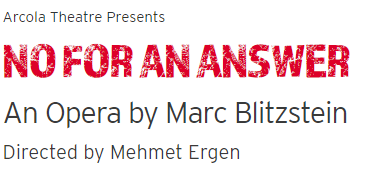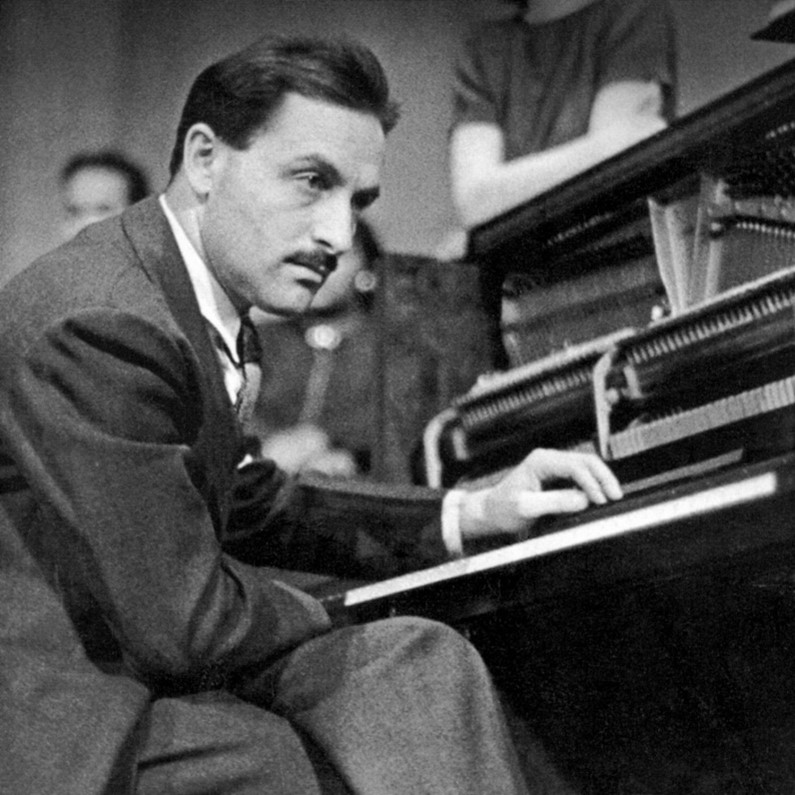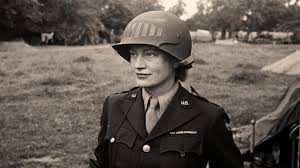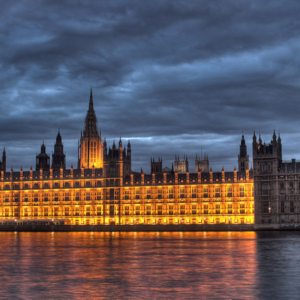Migrants under physical and ideological attack…police using strong-arm tactics against activists…communities and workers coming together to fight back in very difficult conditions…police informers sabotaging the fightback; and the problem of working out who is really on your side. This folk opera may be set in the Depression years and written in 1941, but it speaks to us since all this is still happening here and elsewhere in the world today.
The genre that Bertolt Brecht and Kurt Weill created in Europe during the interwar years served as inspiration for this musical. It was a popular form of opera for a mass audience but aimed at exposing capitalism and supporting struggles for a better world. Leonard Bernstein was a friend of Blitzstein and said he made an ‘incalculable contribution’ to American musical theatre. Bernstein went on to make West Side Story, which became a global success, but you can see the links with Blitzstein’s work.

No For An Answer tells the story of a Greek community club that served as a social and community resource. You can see similar clubs even today in our cities. We have Turkish and Kurdish ones in Hackney. Indeed, over the years, they have been attacked by racists. Mehmet Ergen, the founder of the Arcola Theatre and director of the play, reminded the cast of this fact during rehearsals.
“No For An Answer tells the story of a Greek community club that served as a social and community resource. You can see similar clubs even today in our cities.”
In the “jerkwater town” of Crest Lake in upstate New York, poor and ethnic service workers laid off after each underpaid “summer season” gather at the Dionygenes Social Club, otherwise known as Greek immigrant Nick’s lunch counter, to discuss survival strategies. Their gatherings have already attracted disapproving notice from the rich “swells” uptown, who have dispatched thugs to intimidate.
Also attracted here is the slumming swell. Paul, a self-confessed “drunkard and bum,” is driven by the idealistic high that being “down amongst the common people” provides. Paul has plans for a new resort that will supposedly work with the unions. He has brought his conventional socialite wife Clara down with him this time, hoping to convert her to the cause—which could be useful since she is sister to the president of the local bosses’ Resorters Association. Their visit coincides with a jubilant celebration that greets the return (after a six-month Georgia jail term) of Nick’s union-organiser son, Joe.
Clara is loath to believe her own kin would knowingly keep these downtrodden folk underfoot. Yet she refuses to turn a blind eye when police frame Nick’s joint as illegally selling liquor and harbouring bombmakers (Alex’s dumbbells!). The climax finds her proving gutsier than her thrill-seeking husband, though things still end tragically.
Anyone who has read anything about the labour struggles in the USA between the wars will recognise the figures of Joe, the footloose union organiser, and his friend, Max, the radical lawyer. The Industrial Workers of the World (known as the Wobblies) sent their activists out across the country to organise unions. Sacco, Vanzetti, and Joe Hill were activists who were framed and murdered by the state. The Teamsters took up the baton in the 1930s and led big struggles with truck drivers at the forefront. Trotskyists like Farrell Dobbs played a leading role in Minneapolis. Pickets had to organise self-defence against police repression and thugs, often linked to the mob, organised by the bosses. The Ford Motor Company used such methods. In a country that has not produced even an independent working-class party linked to the labour movement, the level of class struggle was remarkably intense and violent. Radical culture was also attacked. The Cradle Will Rock, his better-known earlier musical, was shut down on a pretext by the authorities. Orson Welles stepped in and worked out another venue.
No For an Answer has some great numbers. I enjoyed the Bird and the Beasts, which was an allegory about taking sides, and the defiant title song, which deserves to be an anthem of our movement. It is not all struggle and politics. Joe’s partner, Francie (Katrina Michaels), sings a moving, tender song about her love for him, which was the standout solo of the night. Bulge (Vas Constani), the older Greek worker, has a couple of comic songs that he performs very well. The final scene with Nick (Panayotis Petrakis) leading the singing is a stirring climax.
Although the modern ear may take time to relate to the rhythm, dramatic pace, and style of this musical, this opera has many strong points. The role of Paul and the informer shows the complexity of struggles; it is never as simple as all the good guys against the bad ones. Nick, the bar owner, is for the struggle, but he is not necessarily wedded to politics. People can change too as events impinge on their lives, as Clara does.
The Arcola Theatre has been a great success in Hackney. At a time when theatres have struggled to survive, they have flourished. It is a stage for new talent, and it attracts established ‘stars’ like Toby Jones and Geraldine James. Community involvement is central to the project. Older or younger people who have never performed have been encouraged to get involved.
“The Arcola Theatre has been a great success in Hackney. At a time when theatres have struggled to survive, they have flourished. It is a stage for new talent, and it attracts established ‘stars’ like Toby Jones and Geraldine James.”
The Blitzstein musical kicks off the Grimeborn festival, which has ten other productions over the summer. There are special offers; the more shows you book, the bigger the discount you receive (30% for 6 shows). It is a mixture of classics, new works, and less well-known operas from the past. You can see: The Merry Wives of Windsor (Nicolai/Shakespeare), Turandot (Puccinni), Cenerentola (Rossini), Trouble in Tahiti (Bernstein), Loyola (Zipoli -1720!), A&E (contemporary, Muellas, and Ward), The Portrait of Manon/L’Heure Espagnole (Massenet), Cephale, and Procris (Elisabeth Jacquet de la Guerre).

Blitzstein was openly gay, although he was married briefly in 1933 to novelist Eva Goldbeck, who died of anorexia in 1936. In 1958, Blitzstein was subpoenaed to appear before the U.S. House Committee on Un-American Activities (HUAC). Appearing first in a closed session, Blitzstein admitted his membership in the Communist Party (ending in 1949) and, challenging the right of HUAC to question him at all, refused to name names or cooperate any further. He was recalled for a further public session, but after a day of sitting anxiously in a waiting room, he was not called to testify.
“Blitzstein was openly gay, although he was married briefly in 1933 to novelist Eva Goldbeck, who died of anorexia in 1936. In 1958, Blitzstein was subpoenaed to appear before the U.S. House Committee on Un-American Activities (HUAC).”
Sadly, three sailors that Blitzstein had met in a bar murdered him in 1964 while he was visiting Martinique at the age of 58.
Earlier in his career, he disdained composers like Ravel, whom he thought had dumbed down their music to appeal to a wider audience. Happily, his ideas evolved, and he has left us at least two popular operas that are part of the legacy of our movement.
It is clear to me that the conception of music in society … is dying of acute anachronism; and that a fresh idea, overwhelming in its implications and promise, is taking hold. Music must have a social as well as artistic base; it should broaden its scope and reach not only the select few but the masses.”
(Blitzstein 1935)

Art (55) Book Review (127) Books (114) Capitalism (68) China (81) Climate Emergency (99) Conservative Government (90) Conservative Party (45) COVID-19 (46) EcoSocialism (60) Elections (83) Europe (46) Fascism (63) Film (48) Film Review (69) France (72) Gaza (63) Imperialism (101) Israel (130) Italy (46) Keir Starmer (56) Labour Party (115) Long Read (42) Marxism (49) Marxist Theory (47) Palestine (185) pandemic (78) Protest (154) Russia (343) Solidarity (152) Statement (50) Trade Unionism (144) Ukraine (351) United States of America (140) War (371)
Latest Articles
- Lee Miller ‑a radical lifeDave Kellaway reviews the Lee Miller exhibition at Tate Britain
- No other choice… under capitalismDave Kellaway reviews No Other Choice (2025) directed by Park Chan Wook and starring Lee Byung-hun and Son Ye-jin. In cinemas now and nominated for the Oscars
- Review: Gaza – the story of a genocideTony Richardson reviews ‘The story of a Genocide’ edited by Fatima Bhutto and Sonia Faleiro, publiished by Verso Books, 2025.
- Reforms – Choose Dignity, Unity and Human RightsWith the Government consultation closing on February 12th, Hackney Cllr Claudia Turbet-Delof issues an urgent call to action.
- Germany joins Hungary in prosecuting left‑wing activistsGus Fagan reports on the repression of anti-fascists by Germany and Hungary






